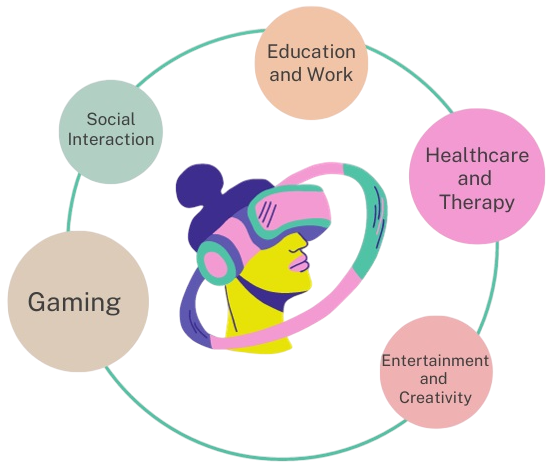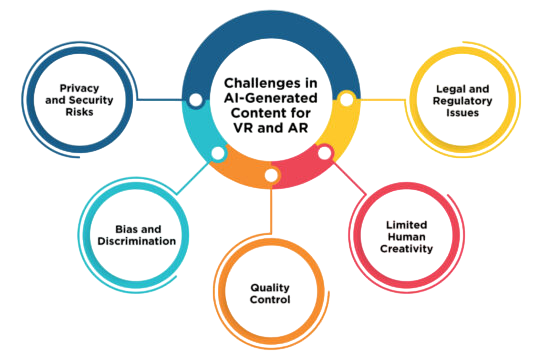
- What is Metaverse
- Definition
- Technologies Involved
- History and Evolution
- Key Platforms
- Use in Gaming
- Virtual Economy
- Social Interaction
- Education and Training
- Challenges and Concerns
- Future of the Metaverse
- Conclusion
What is Metaverse
The Metaverse is rapidly emerging as a transformative digital frontier that merges physical and virtual realities, allowing people to interact, socialize, learn, and work in an immersive 3D space. Its vision is not just a digital world but a parallel universe with its own economy, social interactions, and digital experiences. To build the skills needed to shape and thrive in this intelligent ecosystem, explore Artificial Intelligence Training this program designed to equip learners with cutting-edge AI tools, machine learning frameworks, and real-world applications that power the next generation of immersive digital environments. The rise of technologies such as Virtual Reality (VR), Augmented Reality (AR), and blockchain plays a significant role in the evolution and functionality of the Metaverse. As the digital landscape evolves, the Metaverse promises to reshape industries, from entertainment and gaming to education and healthcare.
Definition
The Metaverse refers to a collective virtual shared space created by the convergence of virtually enhanced physical reality and physically persistent virtual reality. In simpler terms, it is a 3D virtual universe where users interact through avatars, experiencing everything from social gatherings and gaming to professional meetings and learning activities. To ensure inclusive access to such immersive environments, explore Assistive Technology Devices a guide that explains how specialized tools empower individuals with disabilities to navigate digital spaces, communicate effectively, and participate fully in virtual and real-world experiences. It’s an immersive digital ecosystem where interactions mimic real-world social, economic, and cultural practices.
Ready to Get Certified in Artificial Intelligence ? Explore the Program Now Artificial Intelligence Online Training Offered By ACTE Right Now!
Technologies Involved
- Augmented Reality (AR): AR overlays digital content onto the real world. It enhances real-world experiences by adding virtual elements that can interact with physical surroundings. In the Metaverse, AR enables users to blend physical and virtual environments seamlessly, enhancing user interaction in real-time.
- Virtual Reality (VR): VR offers a fully immersive digital environment. Using VR headsets, users can experience complete immersion into virtual worlds that are interactive and engaging. It is one of the primary technologies enabling the Metaverse, creating immersive experiences for gaming, socializing, and training.
- Blockchain: Blockchain technology underpins the virtual economy within the Metaverse. It enables secure transactions, ownership, and verification of digital assets, ensuring that virtual properties, currencies, and NFTs (Non-Fungible Tokens) can be owned, bought, and sold within the Metaverse securely. Blockchain also fosters decentralization, a key element in the Metaverse’s evolution, enabling users to have more control over their virtual experiences.
- Meta (formerly Facebook): Meta, led by Mark Zuckerberg, is one of the most prominent companies working to build the Metaverse. It focuses on creating a fully immersive virtual environment using VR technologies through its Oculus headsets. Meta’s vision involves creating virtual spaces where users can socialize, work, and play in an interconnected virtual world.
- Decentraland: A decentralized virtual world powered by the Ethereum blockchain, Decentraland allows users to buy, sell, and build on virtual land. It’s a key example of how the Metaverse can incorporate blockchain technologies, with users owning digital assets and interacting in a persistent virtual environment.
- The Sandbox: Another blockchain-based platform, The Sandbox lets users create, own, and monetize virtual worlds and assets. It’s an ecosystem driven by user-generated content, where creators can build interactive games and virtual experiences.
- Roblox: Popular among younger audiences, Roblox offers a user-friendly environment for game development and social interaction. It allows users to create their games and experiences, driving a new wave of creativity within the Metaverse.
- Microsoft Mesh: An enterprise-focused Metaverse platform, Mesh is built on the Azure cloud and allows for mixed-reality collaboration. It integrates AR and VR to enhance communication and collaboration for businesses in virtual environments.
- The Metaverse has found its roots in gaming, offering a fully immersive environment where players can interact with both the virtual world and other users. Games like Fortnite, Minecraft, and Roblox have already blurred the lines between gaming and social spaces. They offer virtual economies, in-game events, and even concerts, creating spaces where players can live out alternate realities.
- To understand the intelligent systems powering these dynamic environments, explore Artificial Neural Networks a foundational concept in machine learning that enables pattern recognition, adaptive behavior, and real-time responsiveness in immersive digital ecosystems.
- In these gaming worlds, players use avatars to socialize, compete, and create. The idea of a shared, persistent online world is central to gaming experiences within the Metaverse, where users’ actions and creations have lasting effects. The evolution of these games into virtual economies has expanded the Metaverse, turning them into digital societies with a full range of activities, including commerce and entertainment.
- The Metaverse holds immense potential for transforming education and training. Virtual classrooms and training sessions enable immersive learning experiences that go beyond traditional learning methods. Students can engage in hands-on training, such as surgery simulations or virtual engineering labs, without the risk of real-world consequences.
- Additionally, virtual campuses can host entire educational institutions where students attend classes and interact with instructors and peers through avatars. This could provide access to quality education for individuals in remote or underserved locations. With blockchain technology, certificates and credentials earned within the Metaverse can be verified and stored securely.
- Privacy and Security: The Metaverse collects vast amounts of personal data. Ensuring user privacy and protecting against data breaches is a critical concern.
- Accessibility: The technologies enabling the Metaverse (VR headsets, high-speed internet, etc.) are still not universally accessible, potentially excluding a large portion of the population from fully engaging with the Metaverse.
- Digital Divide: The Metaverse could deepen existing inequalities by requiring users to have access to expensive devices or robust internet connections. Furthermore, not everyone has the necessary digital literacy to navigate virtual environments effectively.
- Regulation and Governance: As the Metaverse grows, questions around governance, property rights, and intellectual property will become more complex. Regulating digital assets, ensuring fairness, and preventing fraudulent activities will be ongoing concerns.
- Mental Health: Prolonged exposure to virtual environments can have psychological effects. The boundaries between the virtual and physical world may blur, potentially leading to issues like addiction or social isolation.
- The future of the Metaverse is marked by rapid growth and innovation. With companies pouring resources into developing the Metaverse, it is expected to evolve into a fully integrated digital ecosystem. As AR and VR technologies improve and become more accessible, we can expect a more seamless experience between the physical and virtual worlds.
- To understand the visual intelligence powering this convergence, explore What is Computer Vision a guide that explains how machines interpret visual data to enable object recognition, spatial awareness, and real-time interaction in immersive environments.
- Blockchain will continue to play a pivotal role, supporting the creation of decentralized worlds, virtual economies, and secure digital assets. The Metaverse could eventually become a multi-faceted platform that encompasses work, entertainment, education, and socializing in one interconnected space.
To ExploreArtificial Intelligence in Depth, Check Out Our Comprehensive Artificial Intelligence Online Training To Gain Insights From Our Experts!
History and Evolution
The concept of the Metaverse first gained prominence in the 1992 science fiction novel Snow Crash by Neal Stephenson. It depicted a virtual reality-based space where users, represented by avatars, interacted with each other and digital environments. This concept of a “cyberspace” or virtual universe evolved into the Metaverse we discuss today, driven by advancements in internet technology, computing power, and immersive media. The development of VR and AR technologies in the early 2000s, alongside the advent of social platforms like Second Life (2003), which offered a virtual world where users could create avatars and interact with others, marked the beginning of the Metaverse’s rise. To complement your learning with scalable data processing skills, explore Apache Spark with These Real-World Projects a hands-on guide that walks you through building production-grade pipelines, applying machine learning algorithms, and optimizing performance across distributed environments. With social media platforms like Facebook rebranding as Meta and the launch of virtual worlds like Decentraland, the concept gained significant traction. By the 2020s, the integration of VR, AR, and blockchain accelerated the Metaverse’s expansion into a more immersive, decentralized digital world.
Key Platforms

Looking to Master Machine Learning? Discover the Artificial Intelligence Expert Masters Program Training Course Available at ACTE Now!
Use in Gaming
Preparing for Artificial Intelligence Job Interviews? Have a Look at Our Blog on Artificial Intelligence Interview Questions and Answers To Ace Your Interview!
Virtual Economy
A significant feature of the Metaverse is the establishment of a virtual economy, where digital assets such as virtual land, collectibles, and NFTs can be bought, sold, and traded. Cryptocurrency is often used as the underlying currency in these environments, providing a secure and decentralized means of transaction. To understand how intelligent systems interact with decentralized technologies and drive innovation in digital ecosystems, explore Artificial Intelligence Training a program designed to equip learners with machine learning frameworks, neural network models, and real-world applications that power secure, data-driven platforms. For example, in Decentraland, users can buy virtual land using MANA, its native cryptocurrency. The economy in the Metaverse mirrors the physical world, with the introduction of jobs, services, and marketplaces. This economic model is expected to grow, with potential for digital goods and services to outpace physical ones in the future.
Social Interaction
One of the defining aspects of the Metaverse is its emphasis on social interaction. The ability to create and customize avatars allows users to express themselves in ways that mirror or enhance their real-world identities. Social interaction within the Metaverse takes many forms, including gaming, attending virtual events (such as concerts or conferences), or simply interacting with others in social spaces. To ensure these immersive experiences are powered by scalable, intelligent infrastructure, explore Mastering Production Systems in AI a guide that delves into how AI-driven architectures support real-time responsiveness, personalization, and seamless integration across virtual environments. Socialization within the Metaverse also spans across platforms. Users can interact across virtual worlds, making the Metaverse a space for diverse, global communities. This shift represents a departure from traditional social media platforms, with a focus on shared experiences in real-time.
Education and Training
Challenges and Concerns

Future of the Metaverse
Conclusion
The Metaverse represents a new frontier in the digital age, with vast potential to reshape industries, redefine human interaction, and create a new virtual economy. While it is still in its early stages, the technologies driving the Metaverse, including AR, VR, and blockchain, are already transforming how we perceive and engage with the digital world. To understand how intelligent systems integrate with immersive technologies and shape user experiences, explore Artificial Intelligence Training a program designed to equip learners with machine learning models, neural networks, and real-time data processing skills that power the next generation of virtual environments. Despite challenges in privacy, accessibility, and regulation, the Metaverse’s future looks promising, with the potential to become an essential part of our daily lives. As the technology continues to evolve, we can expect the Metaverse to unlock new possibilities for communication, entertainment, education, and more, ushering in an era of virtual experiences that are as tangible and impactful as those in the physical world.




